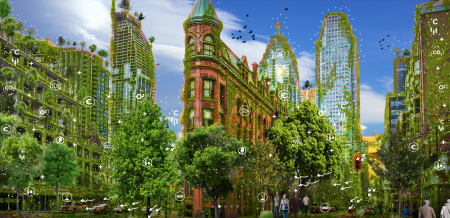
Area characterisation:
Localisation: Germany
Scale of the project: city
Scales impacts from this NbS action should be assessed at national and neighbourhood levels.
Objective:
- To place green space topic in urban development on political agenda;
- Improvement of legal integration of urban green infrastructure;
- Introduction for targeted support measures;
- To further develop guidelines and tools;
- To carry out Best-pratice examples;
- General communication improvement.
The White Paper proposes recommendations for action and concrete measures for the next few years through which it will, within its areas of competence, support municipalities and other actors in strengthening urban green infrastructures. The government will thus make a key contribution to improving quality of life, environmental justice and climate resilience within cities. The White Paper defines ten fields of action for protecting and enhancing urban green and open space as a longer-term initiative for high quality urban spaces.
Financing:
Global (estimated) cost of the project: unknow
FINANCIAL MODEL:
Financial cluster: cluster1 public financing
Contacts:
Kraus , Florian (florian.kraus@green4cities.com)
Company (landscape/architecture agency)
Westbahnstraße 7/6a
--> www.green4cities.com
Stakeholder Participation/Participatory Planning and Governance:
- Contrating authorities: Federal Ministry for the Environment / Nature Conserva-tion / Building and Nuclear Safety (BMUB)
- Project manager: National institute for construction, city and space research (BBSR)
Main partners:
- Federal Office for Nature Conservation (BfN), Urban planning office
- German Environment Agency (UBA), landscape planning office
- Julius Kühn-Institut (JKI), institute for urban green
GOVERNANCE MODEL:
Not concerned.
Temporal perspective
Expected time for the NbS to become fully effective after its implementation: large (beyond 5 years)
Expected life time of the intervention: around 10 years
Dates (for project delivered): 2017
Success and Limiting Factors:
Process enablers:
Knowledge drivers → Information accessibility → knowledge platforms
Process inhibitors:
Knowledge barriers → Technical inadequacy → Lack of readytoapply
BUSINESS MODEL:
Business cluster: Organizational
Business model: Re-purpose the business for society/environment
Further information:
Official docreader (tranlator included): here
To download the document (only available in german): https://www.bmi.bund.de/SharedDocs/downloads/DE/publikationen/themen/bauen/wohnen/weissbuch-stadtgruen.html